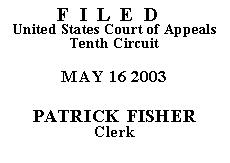

|
UNITED STATES OF AMERICA,
v.
DON CARNEY |
|
I. Background On appeal, Mr. Carney argues that he was deprived of his Sixth Amendment right to counsel based on his trial counsel's failure to seek downward sentencing departures for "multiple causation" and the absence of financial gain. Mr. Carney did not raise his ineffective assistance of counsel claim before the district court prior to initiating this appeal.(1)
II. Discussion
This court has stated that, ordinarily, "[i]neffective assistance of counsel claims should be brought in collateral proceedings, not on direct appeal." United States v. Galloway, 56 F.3d 1239, 1240 (10th Cir. 1995) (en banc). Accordingly, "[s]uch claims brought on direct appeal are presumptively dismissible, and virtually all will be dismissed." Id. As we noted in Galloway, the reason for this rule is straightforward:
A factual record must be developed in and addressed by the district court in the first instance for effective review. Even if evidence is not necessary, at the very least counsel accused of deficient performance can explain their reasoning and actions, and the district court can render its opinion on the merits of the claim.
Id. (footnote omitted). This rule "encourages development of a record on the tactical reasons for trial counsel's decisions, the extent of trial counsel's alleged deficiencies, and the asserted prejudicial impact on the outcome of the trial." Beaulieu v. United States, 930 F.2d 805, 807 (10th Cir. 1991), overruled in part by Galloway, 56 F.3d at 1241.
The Supreme Court recently approved of this circuit's approach in Massaro v. United States, __ U.S. __, 123 S.Ct. 1690 (2003). In Massaro, the Supreme Court considered a Second Circuit rule, originally set forth in Billy-Elko v. United States, 8 F.3d 111 (2d Cir. 1993), requiring that a criminal defendant raise ineffective-assistance claims on direct appeal when the defendant is represented by new counsel on appeal and the ineffective assistance claim is based solely on the record made at trial, and further providing that a party's failure to do so ordinarily results in the claim being procedurally barred, absent a showing of cause and prejudice.
The Supreme Court reversed, refusing to adopt the Second Circuit's rule. However, although the Court held that ineffective assistance of counsel claims should ordinarily be brought in a collateral proceeding under 28 U.S.C. § 2255, the Court recognized certain situations in which such claims would be appropriately considered on direct appeal. Id. at 1696. Specifically, the Court stated:
We do not hold that ineffective-assistance claims must be reserved for collateral review. There may be cases in which trial counsel's ineffectiveness is so apparent from the record that appellate counsel will consider it advisable to raise the issue on direct appeal. There may be instances, too, when obvious deficiencies in representation will be addressed by an appellate court sua sponte.
Id.(emphasis added); see also United States v. Gallegos, 108 F.3d 1272, 1279-80 (10th Cir. 1997) (stating that where claim of ineffective assistance is well-documented in the record and where defendant asserted her claim at trial and in a post-trial motion that was ruled on by the district court, the court would review her claim on direct appeal); United States v. Carter, 130 F.3d 1432, 1442 (10th Cir. 1997) (noting that where the record has been sufficiently developed by the district court, the court of appeals "can agree to consider the claim on direct appeal").
Here, Mr. Carney contends that the record from the two sentencing hearings is sufficient for this court to consider his ineffectiveness-assistance claims. We disagree. The record before us does not conclusively demonstrate either the presence or absence of "tactical reasons for trial counsel's decision." Beaulieu, 930 F.2d at 807. Thus, this is not a situation where the alleged ineffectiveness is "so apparent" from the record that we should hear the claim on direct appeal. Massaro, 123 S. Ct. at 1696.
III. Conclusion
For the foregoing reasons, we DISMISS Mr. Carney's appeal without
prejudice to Mr. Carney's right to raise his ineffective assistance of counsel claims in a collateral proceeding.
ENTERED FOR THE COURT,
Deanell Reece Tacha
Chief Circuit Judge
*.This order and judgment is not binding precedent, except under the doctrines of law of the case, res judicata, and collateral estoppel. This court generally disfavors the citation of orders and judgments; nevertheless, an order and judgment may be cited under the terms and conditions of 10th Cir. R. 36.3.
1. Although Mr. Carney raised ineffective-assistance arguments in a post-trial motion for release pending appeal, he did not raise all of his ineffective assistance of counsel claims in the district court.